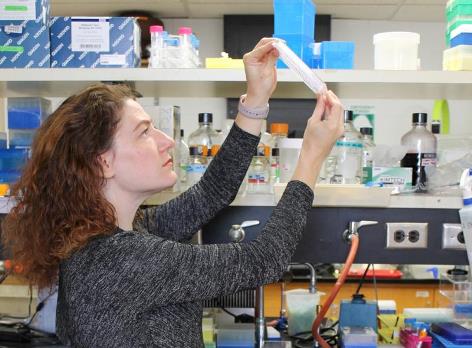by Dan Margolies, Heartland Health Monitor
A University of Kansas scientist has been named one of the first recipients of an $825,000 fellowship for her work in developing a protein designed to thwart antibiotic resistance.
Joanna Slusky, 37, who heads the Slusky Lab at KU and specializes in outer membrane proteins, is one of five inventors nationwide recognized by the Gordon and Betty Moore Foundation in Palo Alto, Calif.
The foundation, established by the co-founder of Intel Corp. and his wife, anticipates awarding a total of $33.75 million to support 50 promising inventors over the next 10 years, according to its website. Slusky is part of the first cohort announced Wednesday.
Slusky is an assistant professor of computational biology and molecular biosciences at KU. She was recruited there two years ago after completing postdoctoral work at Stockholm University and the Fox Chase Cancer Center in Philadelphia. She received her doctorate in biochemistry and molecular biophysics from the University of Pennsylvania.
Her lab looks at how outer membrane proteins fold. It seeks to develop applications for cancer therapeutics, vaccine development and environmental remediation.
The invention for which Slusky is being recognized is a so-called “helper” protein that disables a bacterium’s ability to protect itself from attack by antibiotics.
“In order to do that, what one needs to do is disable the resistance mechanism of the bacteria,” Slusky said in a telephone interview.
Slusky said the resistance mechanism is a protein pump that pushes antibiotics out of a cell, thwarting their ability to kill it.
“So I’m making proteins that disable that resistance and disable it in a particularly interesting way that has never been tried before,” she said.
Overuse and misuse of antibiotics have spawned antibiotic-resistant bacteria, one of the world’s most pressing health problems. Illnesses that were once easily treatable with antibiotics now often mutate into dangerous and sometimes life-threatening infections.
“More than 700,000 people are dying worldwide every year from antibiotic-resistance infections,” Slusky said.
Some studies project that, if current trends continue, by 2050 more people in the United States will die from such infections than from cancer.
Slusky’s invention is still a long way from coming to market. It has yet to undergo preclinical studies, let alone clinical trials in humans.
“It’s probably a minimum of 15 years off, or something like that,” Slusky said. “And that’s partly related to the fact that it takes so long, once you have something that works, to bring to market.”
The Moore Foundation money — $825,000, including $50,000 from KU, over three years — will help accelerate that process. The funds will enable Slusky to do more hiring, plan more long-term experiments and, with any luck, begin pre-clinical trials in three to five years.
“We are investing in promising scientist problem solvers with a passion for inventing — like Gordon Moore himself,” said Harvey V. Fineberg, president of the Gordon and Betty Moore Foundation, in a news release. “By providing support to these early-career researchers, we can give them the freedom to try out new ideas that could make a real and positive difference.”
The release said that Slusky’s invention “could have a global impact on antibiotic resistance and re-establish the efficacy of antibiotics.”
The other recipients of this year’s Moore Foundation awards are Deji Akinwande of the University of Texas, Shane Ardo of the University of California, Irvine, Xingjie Ni of Pennsylvania State University and Mona Jarrahi of the University of California, Los Angeles.
The awards are being given on the 50th anniversary of Gordon Moore’s now-famous prediction, known as Moore’s law, that components on integrated circuits would double every 18 months, exponentially increasing computer power.
The nonprofit KHI News Service is an editorially independent initiative of the Kansas Health Institute and a partner in the Heartland Health Monitor reporting collaboration. All stories and photos may be republished at no cost with proper attribution and a link back to KHI.org when a story is reposted online.
– See more at: http://www.khi.org/news/article/ku-scientists-work-on-antibiotic-resistance-wins-inventor-award#sthash.hxCPh8Fg.dpuf

